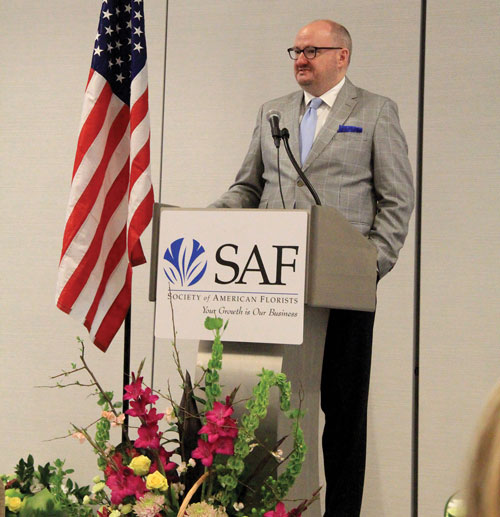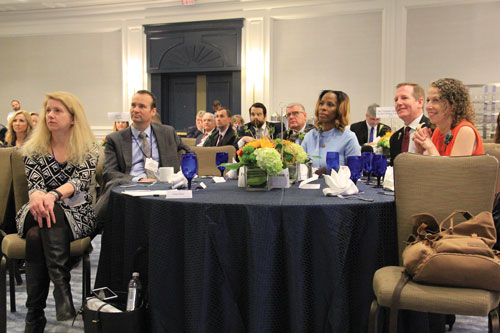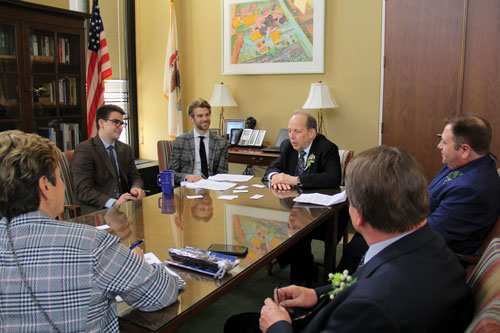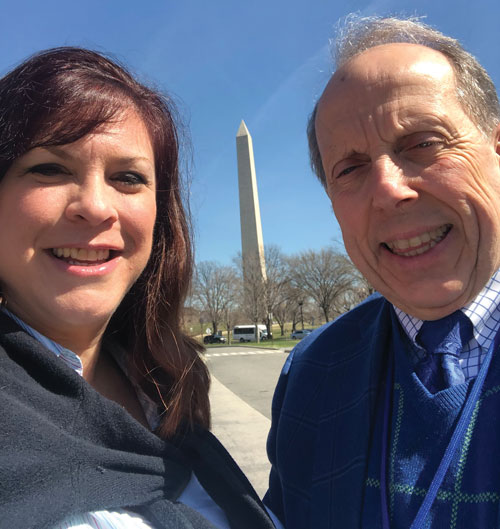4/1/2020
Congressional Action Days: Less Voices, But Still Heard
Jennifer Zurko

The Society of American Florists’ 40th Annual Congressional Action Days may have been on the smaller side, but the people who were there were still able to get to Capitol Hill to have their voices heard.
Pictured: Cornerstone Senior VP Matt Paul talking about the upcoming election.
 When CAD was held on March 9-10, COVID-19 was just ramping up steam, with the first confirmed case in Washington, D.C. announced the day I arrived, along with some legislators going into self-quarantine because they were exposed to someone who tested positive. It was the reason that attendance was down this year and that no hands were shaken, lots of hand sanitizer was being used and some legislative meetings happened via conference call.
When CAD was held on March 9-10, COVID-19 was just ramping up steam, with the first confirmed case in Washington, D.C. announced the day I arrived, along with some legislators going into self-quarantine because they were exposed to someone who tested positive. It was the reason that attendance was down this year and that no hands were shaken, lots of hand sanitizer was being used and some legislative meetings happened via conference call.
Pictured: SAF’s Katie Butler, Cornerstone’s Dr. Joe Bischoff, Congresswoman Stacey Plaskett (D-VI), SAF Board President Chris Drummond and SAF CEO Kate Penn.
But despite the pall of the coronavirus hanging over the Capitol, it was still before most states went on lockdown, so the timing was right to come together to discuss which legislative policies were affecting florists and cut flower growers around the country.
Kate Penn, Executive VP and CEO of SAF, said that now, more than ever, people will need to find comfort in the little things—and that should include flowers and plants.
“We need to be better at communicating our story to consumers and connecting the emotional impact that flowers can have,” she said.
 The issues
The issues
The main “asks” at this year’s CAD were:
• Continued support for agricultural labor and addressing the labor crisis—since the House already passed the Farm Workforce Modernization Act in December, this message was more geared toward thanking the House members who supported the bill and asking our Senate representatives to work on legislation that was similar or complemented H.R. 5038.
Pictured:Having a great conversation in Senator Dick Durbin’s (D-IL) office. From left to right: Traci Dooley, Andrew Posegay, Kevin Lefeber, Dr. Marvin Miller, Dave Mitchell and Tim Noble.
• Pass the bills H.R. 1869 and S. 803 that would fix the qualified improvement property (QIP) error in the 2017 Tax Cuts & Jobs Act (TCJA). Before the TCJA, the law defined improvements to real property in three separate ways: qualified leasehold improvement property, qualified restaurant property and qualified retail improvement property—each under a 15-year class life, meaning the years of depreciation for long-term property. Under the TCJA, all three definitions were consolidated under QIP, but that law failed to classify the new definition of QIP as within the 15-year class life. Without a correction, QIP would default to a 39-year standard for nonresidential property.
• Passing legislation reauthorizing the Generalized System of Preferences (GSP), which supports the floral industry by containing costs, and providing importers and retailers with greater price certainty. GSP has been in place for more than 45 years after the UN Conference on Trade & Development, allowing florists to benefit from duty-free imports of cut flowers. Dollars that are saved on duty-free goods are used to hire staff, for marketing and product promotion and to invest in the future of the business. GSP must be reauthorized by December 31, 2020.
Election (non) predictions
With this being an election year and the Democratic primary getting down to the wire, most of the talk outside of the asks was centered around predictions for November.
 Matt Paul, a senior VP at Cornerstone—the company that helps SAF with their government relations—has been in politics for years. He worked on Bill Clinton’s campaign, in the Obama Administration and was Senator Tim Kaine’s chief-of-staff during his run for vice president with Hillary Clinton’s campaign.
Matt Paul, a senior VP at Cornerstone—the company that helps SAF with their government relations—has been in politics for years. He worked on Bill Clinton’s campaign, in the Obama Administration and was Senator Tim Kaine’s chief-of-staff during his run for vice president with Hillary Clinton’s campaign.
Pictured: SAF organized a fabulous walking tour to the major D.C. monuments. Here’s me and Ball Horticultural’s Dr. Marvin Miller enjoying the beautiful weather in front of the Washington Monument.
If anyone was looking for Matt to say what he thought was going to happen, they were sadly disappointed—not because he didn’t want to, but because in this political climate, it’s an impossible task.
“It’ll be a fascinating year and it’ll change day by day,” said Matt. “Politics is of the moment.”
And between now and July 13, when the Democrats officially announce who their nominee will be at the Democratic National Convention, it will be all about momentum, said Matt.
“Polls are a snapshot in time, but it’s a good indicator of current mood” he explained. “Because of how much money is spent in elections, you can get more early voting data. But you have to match the data with what you hear on the ground.” —J.Z.
Trucking/Ag Commodity Letter Sent to Appropriators
A bipartisan Congressional letter was sent to the House Appropriations Subcommittee handling transportation issues in early March, asking that the “agricultural commodity” language from the Agricultural Trucking Relief Act be included in FY2021 appropriations bills. The effort, which was led by Reps. Austin Scott (R-GA) and Kurt Schrader (D-OR), yielded 33 signatures in total—26 Republicans and seven Democrats representing 15 states. Of note, House Agriculture Chairman Collin Peterson (D-MN) was among the signatories.
The language would specifically include horticulture and floriculture in the “agricultural commodity” definition used for transportation policy. If included and passed into law, this would put the industry in a very positive position, allowing for peace of mind regarding use of existing hours of service exemptions, such as the agricultural exemption, as well as other regulations specific to agriculture.
In another positive development, the coalition fighting for a change to the agricultural commodity definition grew larger, with organizations such as United Fresh Produce Association and U.S. Apple Association joining the cause. In total, the measure was supported by American Farm Bureau Federation, AmericanHort, American Trucking Associations, Catfish Farmers of America, National Association of State Departments of Agriculture, National Aquaculture Association, National Christmas Tree Association, the Turfgrass Producers International, United Fresh Produce Association, United Potato Growers of America, U.S. Apple Association, and Washington Winegrowers.
—Tal Coley, Director of Government Affairs, AmericanHort
H-2B: More Visas Announced, But Many Strings Attached
On March 5, the Department of Homeland Security (DHS) announced that it plans to make 35,000 supplemental H-2B visas available this fiscal year. Unfortunately, while the 35,000 visas would mark the highest number of supplemental visas that the Administration has chosen to release over the past few years, the number still falls woefully short of the needs of the landscape and horticulture industry. Further, the Administration has proposed adding redundant reviews by the Department of Labor and other restrictions that will severely limit the ability of many of our members to access these visas. DHS has announced that it will soon finalize these announced visas and policies in a temporary final rule. DHS also said that it plans to increase workplace compliance visits.
As of February 26 (the date on which DHS announced that the second 33,000 visa cap was reached was February 18), seasonal employers requested a total of 160,803 H-2B workers for fiscal 2020, 106,547 of which have been approved by the Department of Labor (DOL) with an additional 54,256 H-2B workers still pending. The first 33,000 visa cap was reached on November 15, 2019.
According to the DHS announcement, the supplemental H-2B visas will be made available in two tranches: 20,000 for companies with a date of need of April 1, and 15,000 for companies with a date of need after May 15. Additionally, 10,000 of the “first tranche” visas will be earmarked for nationals of Guatemala, El Salvador and Honduras, countries whose workers haven’t traditionally participated in the H-2B program. The second 10,000 visas in the first tranche will be limited to returning workers.
The second tranche of 15,000 visas will be limited to employers whose date of need is after May 15, despite the fact that the majority of seasonal employers had an April 1 date of need. The new restriction that requires matching start dates on an H-2B petition and the employer’s start date of need would likely require employers to begin the H-2B labor certification process over again and designate a new date of need even though their existing DOL-approved temporary labor certifications continue to be valid for post-April 1 work. These visas will also be limited to returning workers. This hasn’t been a requirement in the previous three years that the Administration released supplemental visas.
Until a final rule is released, AmericanHort and the H-2B Workforce Coalition will continue to urge the Administration to eliminate the proposed restrictions on the supplemental visas. We also continue to urge Congress to pass H-2B reform legislation that ensures that the number of annual H-2B visas reflects the actual economic need for these visas.
—Craig Regelbrugge, VP of Government Relations & Research, AmericanHort
AmericanHort Advocates for Critical Research Funds
With the Congressional appropriations season underway, the AmericanHort advocacy team has reached out to House offices who control the nation’s purse strings. We’ve met with House Appropriations Agriculture Subcommittee members Reps. Sanford Bishop (D-GA) and John Moolenaar (R-MI), with additional visits scheduled. These visits enable us to educate decisionmakers on vital industry programs, such as the Floriculture & Nursery Research Initiative (FNRI) and the IR-4 Program.
FNRI is vital to our industry efforts to overcome pest and disease challenges, enhance the efficiency of production practices, develop and promote sustainable growing practices, and advance the economic, environmental, and human health benefits of our industry’s products and services. The focus of our FNRI outreach is to protect the program from any potential cuts while emphasizing its importance to horticulture.
The IR-4 Project was established to facilitate regulatory approval of sustainable pest management technology for specialty crops, including environmental horticulture crops, to promote public health and well-being. Funding for the IR-4 has remained stagnant for the past few years and there is currently a request to increase the program’s funding to $20 million, up from the current funding level of $12 million. Of note, the President’s budget calls for an increase in the program as well, to a level of $17 million.
We will continue to provide updates on this outreach and status of these key industry programs.
—Tal Coley, Director of Government Affairs, AmericanHort